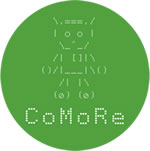Responsibility Matters Workshop Series (RMWS) invites academics, researchers, industry practitioners, policy makers and NGO representatives to share research findings, prospective projects, field analysis or broad societal concerns revolving around the topic of responsibility.
The year-based event is a forum for open debate of ideas and proposals coming from various research fields as diverse as philosophy, law, computer science, biology, sociology, history or economics, fostering cross-border collaboration between academia and public, private and nongovernmental sectors.
Given the complex nature of responsibility, with its retrospective and prospective dimensions, situated at the intersection of causal, agential, role-based duties and social, moral, legal contexts, the RMWS aims to bring together various pieces of the puzzle through interdisciplinary dialogue between cutting-edge research and practice.
2022 topic of Responsibility Matters Workshop Series
Responsible Robotics: agency, virtues and art
The 2nd edition of the Responsibility Matters Workshop Series (RMWS) explores the topic of “Responsible Robotics” at the crossroads between agency, virtues and art, with respect to moral, social and environmental stakes in an era in which robotic AI systems are beginning to permeate our day-to-day lives, from the job market and transportation, to education, artistic production, accessibility, surveillance and beauty, to name a few.
The deployment of such technologies raises various ethical concerns, especially when robots equipped with machine learning systems may display a high degree of autonomy so that they exhibit (moral) agency, which further raises concerns regarding responsibility attributions for decision-making, but also for authorship and creativity. Relatedly, robotic autonomy and agency raises concerns over human interaction, e.g, the adequacy of displaying virtuous behaviours towards machines. Such concerns generate normative implications for the way robots should be designed, developed, regulated and used.
“Responsible Robotics: agency, virtues, and art” workshop addresses these concerns from mixed perspectives of ethics, art, philosophy of technology, and epistemology, revolving around questions such as: How much autonomy and agency can/should robots really display? How can virtue ethics inform the field of Responsible Robotics? What are the ethical concerns raised by the prospect of robot artists? What role can epistemology play in Responsible Robotics? How may technologies become probes to explore the great outdoors in an all-inclusive — yet responsible — fashion?
When: November 10, 15.00-19.30hrs EET (Bucharest time)
Where: Faculty of Philosophy + online, via Zoom platform
Connection info:
Topic: Responsibility Matters Workshop Series – Responsible Robotics. Agency, virtues and art
Time: Nov 10, 2022 04:00 PM Bucharest
Join Zoom Meeting
https://zoom.us/j/92004058643
Meeting ID: 920 0405 8643
Who: Keynote speakers: Sven Nyholm (Utrecht University), Marinos Koutsomichalis (Cyprus University of Technology)
Guest speakers: Mihály Héder (Technical University of Budapest), Cornel Moraru (Bucharest National University of Arts)
CoMoRe team: Cristina Voinea, Radu Uszkai, Constantin Vică, Mihaela Constantinescu
Responsible Robotics: agency, virtues, and art
November 10, 2022 (hybrid event)
15:00-15:10 Welcome note
Session I, on-site
15.10 – 15.40 CoMoRe Team: Mihaela Constantinescu, Cristina Voinea, Radu uszkai, Constantin Vică – Virtue ethics and responsible robotics. On human vs. artificial moral agency
15.40 – 16.00 Break
Session II, on-site / online
16.00 – 16.50 – Keynote: Marinos Koutsomichalis (Cyprus University of Technology) – Do androids dream of electric humans? – Tales of computational aesthetics, machine mediation, and more-than-human agency.
17.00 – 17.30 Guest: Cornel Moraru (Bucharest National University of Arts) – Hallucinating art. What does Artificial Intelligence teach us about aesthetic experience*
17.30-18.00 Break
Session III, on-site / online
18.00-18.50 Sven Nyholm (Utrecht University) – Is there a Vice/Virtue Asymmetry in the Ethics of Human-Robot Interaction?
18.50 – 19.20 Mihály Héder (Budapest University of Technology and Economics) – Epistemology helps more than Ethics at responsible AI design
19.20-19.30, Closing remarks
Speakers
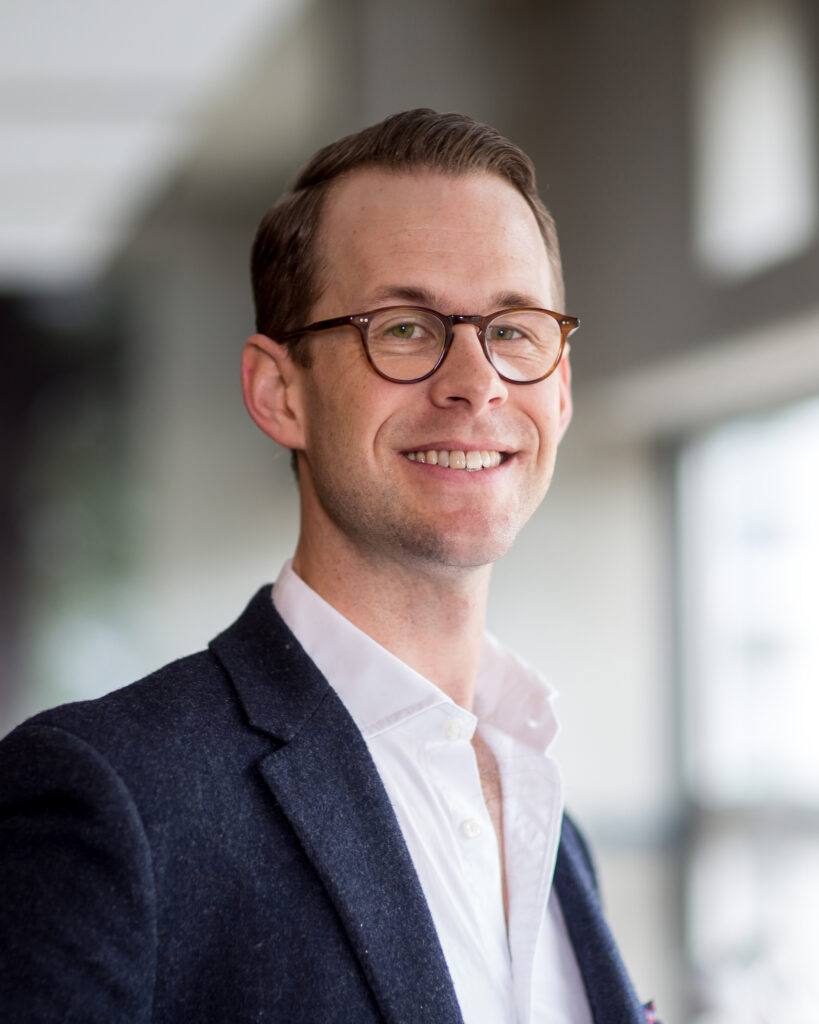
Sven Nyholm is an Associate Professor of Philosophy at Utrecht University in the Netherlands. He writes on ethical theory, human self-understanding, and philosophical questions about emerging technologies (especially artificial intelligence and robots). Among his publications are the books Revisiting Kant’s Universal Law and Humanity Formulas (De Gruyter, 2015), Humans and Robots: Ethics, Agency, and Anthropomorphism (Rowman & Littlefield, 2020), and This is Technology Ethics: An Introduction (Wiley-Blackwell, 2023).
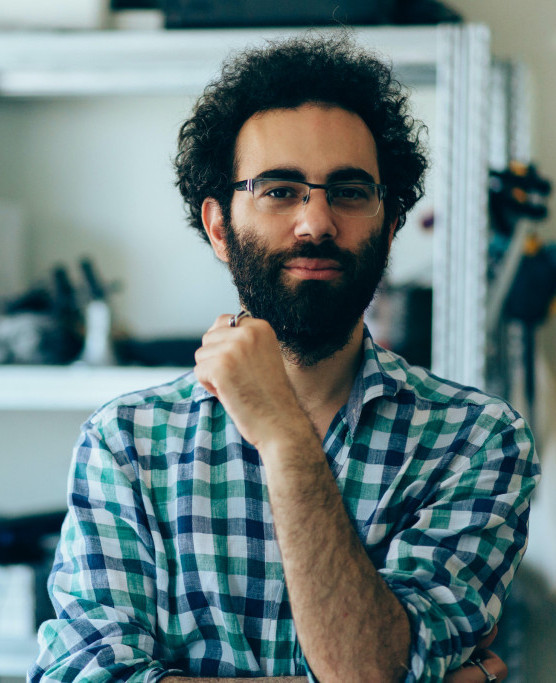
Marinos Koutsomichalis is an artist, scholar, and creative technologist. He is broadly interested in the materiality of self-generative systems, (post-)digital objecthood, sound, image, data, electronic circuitry, perception, selfhood, landscapes/environments, and the media/technologies we rely upon to mediate, probe, interact, or otherwise engage with the former. He has exhibited or performed his work extensively and internationally and has held research or teaching positions in Greece, Italy, Norway, and the U.K. He is a Lecturer in Creative Multimedia at the Cyprus University of Technology (Limassol, CY) where he co-directs the Media Arts and Design Research Lab.
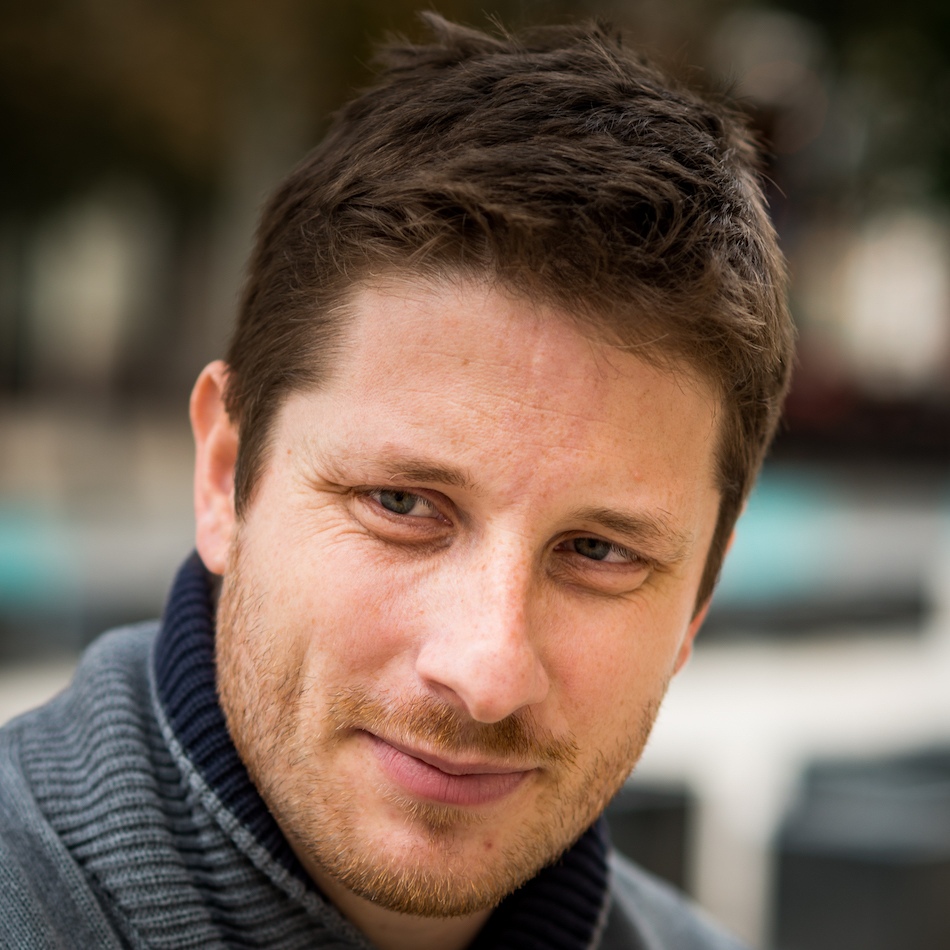
Mihály Héder is a Philosopher with a Software Engineering background at Budapest University of Technology and Economics. He defended his PhD thesis on the Philosophy of Artificial Intelligence in 2014. He teaches Research Methodology, Science and Technology Studies, Economics, and Philosophy of Technology. He is deeply concerned about revealing the power of humanities for people with a STEM background.
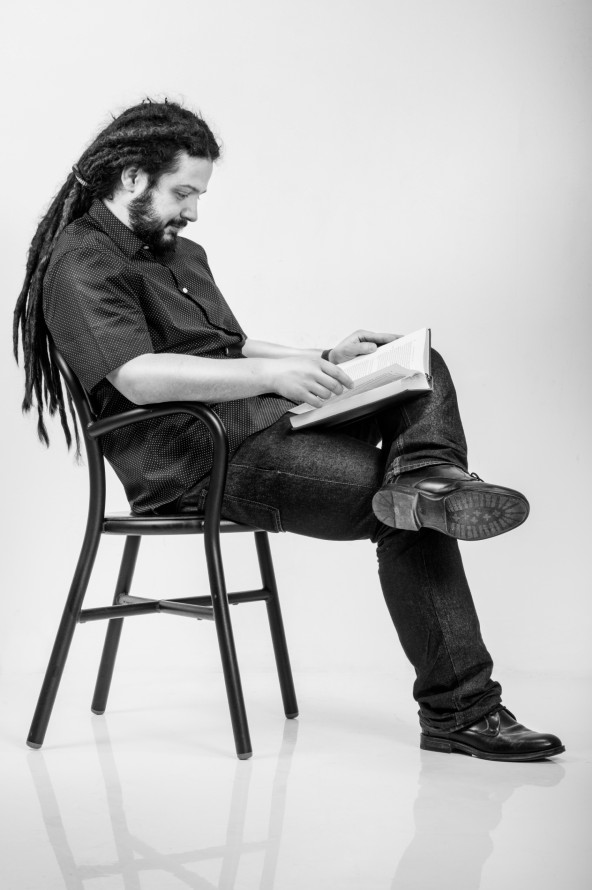
Cornel-Florin Moraru is lecturer of Philosophy, Aesthetics and Applied Ethics at The National University of Arts in Bucharest. With an interdisciplinary formation in philosophy, classical philology, cybernetics and visual arts, his research interests spread from hermeneutics and history of philosophy to information aesthetics and neuroaesthetics. He has so far published three books in the field of philosophy and numerous scientific articles. For a complete CV, please refer to his personal website – www.cornelmoraru.ro
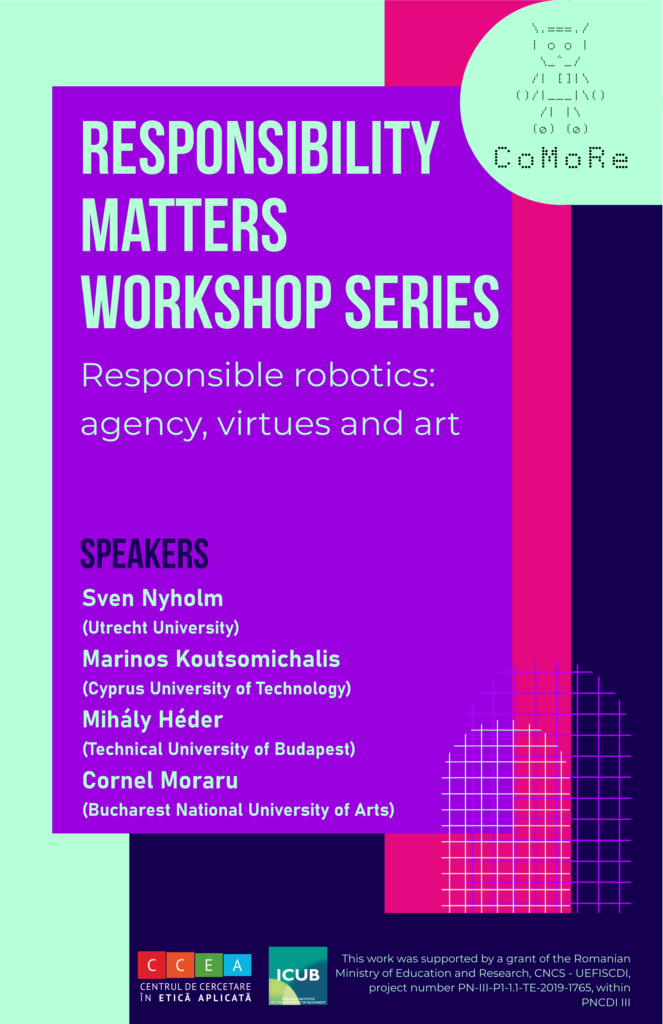
*Paper supported by UEFISCDI research project PN-III-P1-1.1-TE-2021-0439, “Be You” (A fi tu însuți în era rețelelor sociale – o abordare a esteticii autenticității din perspectiva ontologiei virtuale), TE 64, 12/05/2022.
2021 topic of Responsibility Matters Workshop Series
AI & Moral Responsibility
The 2021 debut edition of the Responsibility Matters Workshop Series focuses on Artificial Intelligence and moral responsibility. We are technically on the verge of deploying self-driving cars, autonomous weapon systems, robotic caregivers or artificial companions.
But the perspective of scaling up such AI systems raises several ethical concerns. Who is morally responsible for the decisions taken by highly autonomous AI systems in these various domains? Whom do we blame for the effects generated by these artificial entities on the roads, in military conflicts, medical settings or even in our homes?
How can our current ethical frameworks make sense of AI moral responsibility? These are the main questions that drive researchers into open debate on a timely and pressing topic of the decade: AI & moral responsibility.
When: October 21, 16.00-20.00hrs EET (Bucharest time)
Where: online, via Zoom platform
Who: Keynote speakers: prof. Roger Crisp (St. Anne’s College, Oxford); prof. Julian Savulescu (Oxford Uehiro Centre for Practical Ethics)
Guest speakers: Andreas Theodorou – (Umeå University), Emilian Mihailov (ENHATEC project, University of Bucharest)
CoMoRe team: Cristina Voinea, Radu Uszkai, Constantin Vică, Mihaela Constantinescu
Responsibility Matters Workshop Series: AI & Moral Responsibility
21 October, 2021 (online event)
16:00-16:10 Welcome note
Session I
16:10-16.50 Keynote: Roger Crisp (St. Anne’s College, Oxford) – AI and Moral Responsibility
16:50-17:15 Guest: Andreas Theodorou (Umeå University) – Ethics for, by, in design
17:15-17:40 Cristina Voinea & Constantin Vică (Research Center in Applied Ethics, CoMoRe) – Me and my Robot, Best Friends Forever!
17:40-18:00 Break
Session II
18:00-18:40 Keynote: Julian Savulescu (Oxford Uehiro Centre for Practical Ethics) – AI and Drs’ Moral Responsibility
18:40-19:05 Guest: Emilian Mihailov (Research Center in Applied Ethics, University of Bucharest) – Reliability and Trust in AI
19:05-19:30 Mihaela Constantinescu & Radu Uszkai (Research Center in Applied Ethics, CoMoRe) – Artificial Moral Advisors & Moral Responsibility
19:30-20:00 General Q&A, Final remarks
Speakers
 Roger Crisp is Uehiro Fellow and Tutor in Philosophy, at St Anne’s College, Oxford, Professor of Moral Philosophy at the University of Oxford, and Honorary Professor at the Dianoia Institute of Philosophy at the Australian Catholic University. He is the author of Mill on Utilitarianism (1997), Reasons and the Good (2006), The Cosmos of Duty: Henry’s Sidgwick’s Methods of Ethics (2015), and Sacrifice Regained: Morality and Self-interest in the British Moralists from Hobbes to Bentham (2019). He has translated Aristotle’s Nicomachean Ethics for Cambridge University Press, and edited the Oxford Handbook of the History of Ethics.
Roger Crisp is Uehiro Fellow and Tutor in Philosophy, at St Anne’s College, Oxford, Professor of Moral Philosophy at the University of Oxford, and Honorary Professor at the Dianoia Institute of Philosophy at the Australian Catholic University. He is the author of Mill on Utilitarianism (1997), Reasons and the Good (2006), The Cosmos of Duty: Henry’s Sidgwick’s Methods of Ethics (2015), and Sacrifice Regained: Morality and Self-interest in the British Moralists from Hobbes to Bentham (2019). He has translated Aristotle’s Nicomachean Ethics for Cambridge University Press, and edited the Oxford Handbook of the History of Ethics.
 Julian Savulescu is an award-winning ethicist and moral philosopher. Trained in neuroscience, medicine, and philosophy, he has held the Uehiro Chair in Practical Ethics at the University of Oxford since 2002. In 2003, he founded the Oxford Uehiro Centre for Practical Ethics and co-directs the Wellcome Centre for Ethics and Humanities. He is Distinguished Visiting Professorial Fellow at Murdoch Children’s Research institute and Melbourne Law School, where he directs the Biomedical Ethics Research Group. He is a Fellow of the Australian Academy of Health and Medical Sciences and received an honorary doctorate from the University of Bucharest.
Julian Savulescu is an award-winning ethicist and moral philosopher. Trained in neuroscience, medicine, and philosophy, he has held the Uehiro Chair in Practical Ethics at the University of Oxford since 2002. In 2003, he founded the Oxford Uehiro Centre for Practical Ethics and co-directs the Wellcome Centre for Ethics and Humanities. He is Distinguished Visiting Professorial Fellow at Murdoch Children’s Research institute and Melbourne Law School, where he directs the Biomedical Ethics Research Group. He is a Fellow of the Australian Academy of Health and Medical Sciences and received an honorary doctorate from the University of Bucharest.
Andreas Theodorou is a Research Fellow of Responsible 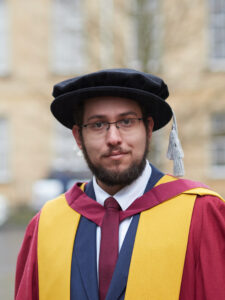 Artificial Intelligence (AI) at Umeå University and the CEO of the start-up VeRAI AB. His research focuses on the understanding and mitigation of the ethical, legal, and cultural issues and challenges that arise from integrating AI into our societies. In parallel to his research, Andreas is an active member of various AI policy initiatives. He has held teaching, research, and visiting research positions at the University of Bath, University of Surrey, and Georgia Institute of Technology. He completed his doctoral thesis, titled “AI Governance Through a Transparency Lens”, in Bryson’s group at the University of Bath.
Artificial Intelligence (AI) at Umeå University and the CEO of the start-up VeRAI AB. His research focuses on the understanding and mitigation of the ethical, legal, and cultural issues and challenges that arise from integrating AI into our societies. In parallel to his research, Andreas is an active member of various AI policy initiatives. He has held teaching, research, and visiting research positions at the University of Bath, University of Surrey, and Georgia Institute of Technology. He completed his doctoral thesis, titled “AI Governance Through a Transparency Lens”, in Bryson’s group at the University of Bath.
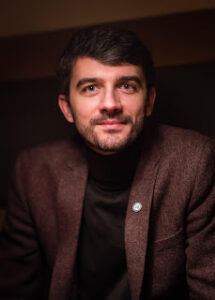 Emilian Mihailov is the director of the Research Centre in Applied Ethics (CCEA) and lecturer at the Faculty of Philosophy, University of Bucharest. His research interests are neuroethics, bioethics, and philosophical moral psychology. He has published on the ethics of enhancement and experimental bioethics in leading journals such as American Journal of Bioethics, Science and Engineering Ethics, Bioethics, Consciousness & Cognition. Emilian is the director of the ENHATEC project. His main objective will be to explore the ethical issues raised by the technology of gene editing and how moral enhancement can address the existential threat of climate change.
Emilian Mihailov is the director of the Research Centre in Applied Ethics (CCEA) and lecturer at the Faculty of Philosophy, University of Bucharest. His research interests are neuroethics, bioethics, and philosophical moral psychology. He has published on the ethics of enhancement and experimental bioethics in leading journals such as American Journal of Bioethics, Science and Engineering Ethics, Bioethics, Consciousness & Cognition. Emilian is the director of the ENHATEC project. His main objective will be to explore the ethical issues raised by the technology of gene editing and how moral enhancement can address the existential threat of climate change.
